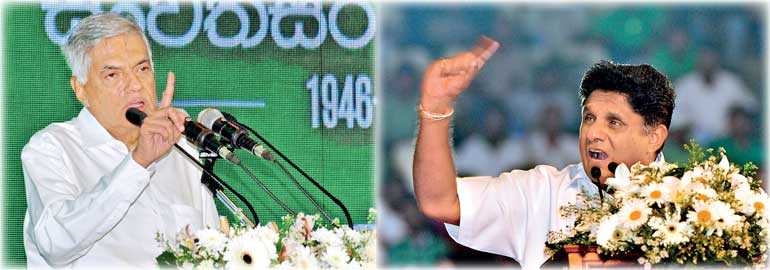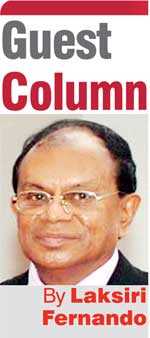Sunday Feb 22, 2026
Sunday Feb 22, 2026
Thursday, 26 September 2019 01:41 - - {{hitsCtrl.values.hits}}

The latest news say that the UNP seniors are willing to agree to a Sajith Premadasa candidacy but on strict conditions, including that Ranil Wickremesinghe should remain the Party Leader and the PM, and Premadasa should commit to the abolition of the executive presidential system. This may be the first time in democratic history such conditions were put forward by a party elite for a presidential candidate. It is still to be seen whether Sajith Premadasa would agree to such conditions or not
What is at issue tomorrow or day after for the UNP is the selection of the best candidate for the presidential contest. This is on the premise that all agree on policies. That premise is also not correct and there has apparently emerged some policy differences between the two main contenders, Ranil Wickremesinghe (RW) and Sajith Premadasa (SP). Therefore, the selection is not only about the person, but also about policies.
Party democracy
This selection is already late given that the nominations have already been called on 18 September, a week ago, and the other two main parties, the SLPP and the JVP, have already selected their candidates. If the procedure is so clear, and it is accepted by all in the party, then there would not have been much delay or controversy.
Even if the apparent controversy is in a way healthy in terms of democracy, as some people have argued, compared to other parties, but the unnecessary delay is not the same. Internal party procedures should not only be democratic but also smooth and orderly. If there is no order, it is not democracy but anarchy or near anarchy. There is nothing particularly wrong in democratic political parties facing crises and those are natural. However, those should be resolved soon amicably and democratically.
Democracy should not only be external to political parties, but also internal. Parties should not only be the advocates of democracy but also be the practitioners. Internal party democracy is something that have come to debate and controversy in many countries in recent time, in Australia, Canada, the UK and now Sri Lanka. The concept is undoubtedly an evolving one. 
Different procedures
There are different ways how different political parties or countries select their leaders or important candidates in democracies world over. The selection of a presidential candidate is an instance of the latter. The methods use can be listed broadly as: (1) Open Primaries (2) Closed Primaries (3) Party Conferences (4) Parliamentary Party (5) Party Elite.
The first two methods have mainly been used in the USA, initially the second (2) and then it evolving into Open Primaries or the first method (1). That is what in operation in America today and in this process even nonpartisan or other party voters also have a say in selecting a candidate of a party if they wish.
This may be too much for Sri Lanka to institutionalise, but this is what we openly do in expressing our opinions, whether they affect the selections or not. We also know, that there are parties and groups outside the party concerned that make considerable influence in the selection process.
In the case of the SLPP, as soon as it was formed, there was a formation named Viyathmaga that sponsored the candidacy of Gotabaya Rajapaksa for the presidency. However, the final decision or the selection came under the fifth (5) method of party elite. Party elite in the case of Sri Lanka, whether it is the SLPP, the SLFP or the UNP, mostly means the leader. That leader most often is linked to a dynasty or a closed family.
In the case of the Rajapaksa family, Shashindra Rajapaksa giving an interview once revealed how the family takes decisions. As he said, they (can) have differences. Then they meet and discuss. They allow all important members to express their views. Sometimes they postpone the decision to allow the members to think back. They allow the elders to prevail in the case of disagreements. After they take a decision, however, they act as one, he said.
Elite/family method
In the case of the UNP, the same elite method goes on. The leader has considerable power or say. Ranil Wickremesinghe has been the Leader now for over 25 years. He has put himself up as the presidential candidate or the PM several times during this period.
Although there is no family behind him like the Rajapaksas at present, his past dynasty cannot be forgotten. He is a nephew of J.R. Jayewardene and the son of Esmond Wickremesinghe. Instead of a family, he is supposed to be flanked by a group of school friends, it is alleged. This Royal group is said to be loyal to him.
Then there are several ‘dynasties’ within this party like in many other parties. Sajith Premadasa is the son of R. Premadasa. This connection is one of the strengths that he has and that he shows. It could be natural for sons (or even daughters) to follow their fathers in politics. However in the case of Sri Lanka this is endemic and not good for internal party democracy or democracy in general.
If one goes through the family connections of the Members of Parliament, most of them are the second generation of a first generation of politicians or parliamentarians. This mostly goes from father to son. This is the same in many other, mainly South Asian countries and Kanchana Chandra has done an important study for India (‘Democratic Dynasties: State, Party and Family in Contemporary Indian Politics,’ 2016). Such a study is in order in Sri Lanka.
Preferred methods
It could be said that most democratic method of selecting a candidate is through the parliamentary group or the party membership or from a combination of both. The party conference is usually utilised for selecting a leader, or endorsing a leader selected by the central, executive or the working committee. However, in the case of Sri Lanka, party conferences are just public events without much decision making power.
The party membership is another component used in Australia and UK for the selection of a leader, apart from the parliamentary group. This could be difficult at present in Sri Lanka given the uncertainties of party membership. However the party members could be consulted in seeking their opinions through surveys or branch committees.
There are opinions even in Australia and the UK that the parliamentary group/members might be the best constituency in selecting a leader as they represent broader sections than the just party members. They are a better barometer, it is argued. This argument also applies in selecting a candidate like for the presidency.
However, in the case of Sri Lanka, none of the two methods are used except in the justification of a closed door selection by the elite or family. Gotabaya Rajapaksa’s candidacy was announced at the rally on 11 August called a ‘party convention’. It was by his leader-brother Mahinda Rajapaksa.
It was also claimed that all or majority of the members of the Joint Opposition (JO) unanimously endorsed the selection. A notable dissent however came from Kumar Welgama, a Kalutara MP of the same JO. The old left firebrand Vasudeva Nanayakkara also opposed Gotabaya Rajapaksa initially, but he is not a MP at present.
UNP procedure?
UNP is claimed to be the most ‘liberal,’ ‘modern’ and ‘democratic’ party in the country. Even it had launched a system of e-membership in June 2016. However today, the UNP’s official website unp.lk is under construction!
The tripod.com nevertheless gives a past glimpse of the party, and the last convention of the party, according to it and other sources, had been held only in December 2013. After achieving the government in 2015, it had not held a convention yet. So much so for party democracy.
It has been strongly and legally argued that only after the announcement of the Presidential Election, that the party can select a candidate according to the UNP Constitution. Therefore, it has to be a hurried and a closed decision within a short space of time. The UNP has been all out to change the JRJ Constitution for the country, but it has not changed rather the obsolete JRJ Constitution for the party.
Accordingly, it is argued that the procedure is in Article 9 (e), which says the Working Committee should meet, appoint a Nominations Board, and the decision of the Board has to be ratified by the Working Committee again. This is not a bad procedure as such, if it is selecting a director for a company. But this is supposed to be a broad based democratic political party and a process. However, the close of nominations is on 7 October, in just 10 days’ time. The party is still procrastinating.
There are obviously several questions about the present UNP Working Committee. Twenty-seven positions are supposed to be vacant at present. That is about one-third of the total membership. At the last meeting on 1 August, only 42 members have attended the WC. There is an apparent hiatus. The new alliance of the Democratic National Front is not yet finalised. However, there is an existing alliance of the UNF and it has 107 members, although some have already defected.
These are the members who have a people’s base or a voter’s base. These are also the people who have to canvass for the selected candidate for the presidency. Even if the party constitution says that the selections cannot be done until the nominations are called, there was no barrier for the Working Committee to decide that the presidential candidate should be selected/elected by the UNP Members of Parliament, or by all MPs of the UNF alliance. The second would have been the most democratic under the circumstances. However, no decision has yet been made.
The latest news say that the UNP seniors are willing to agree to a Premadasa candidacy but on strict conditions: (1) RW should remain the Party Leader and the PM. (2) Premadasa should commit to the abolition of the executive presidential system. (3) He should also commit to the Constitutional Council’s Steering Committee proposals for the resolution of the national question and for a new system of devolution of power.
This may be the first time in democratic history such conditions were put forward by a party elite for a presidential candidate. It is still to be seen whether Sajith Premadasa would agree to such conditions or not. The problem is not resolved yet, but taken into a different plane and direction. The clock is undoubtedly ticking for the UNP.